|
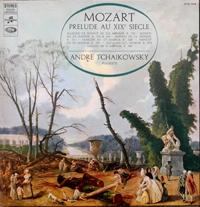
Cover Art
- Columbia
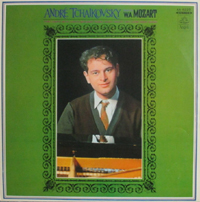
Cover
Art - Toshiba
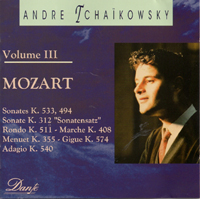
Cover Art - Danté Reissue
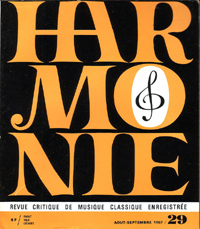
Harmonie
Magazine Review
August-September 1967
Click Here - in French
Click Here - in English
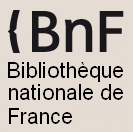
Click
Here - BnF Reference
|
Columbia
Records (EMI Pathé Marconi) CCA-1106 (Stereo)
Japanese Version Toshiba/EMI
AA-8229 (Stereo)
Reissue - Danté Records, HPC035 - Volume 3
Mozart - Prélude au XIXème siècle
Music/MP3:
Mozart Recital
1. Sonata
K533 - Allegro / 01_mozart_sonata_k533_allegro.mp3
2. Sonata K533 - Andante / 02_mozart_sonata_k533_andante.mp3
3. Sonata K494 - Rondo, Andante / 03_mozart_sonata_k494_rondo.mp3
4. Sonata K312 - Allegro / 04_mozart_sonata_k312_allegro.mp3
5. Rondo K511 - Andante / 05_mozart_rondo_k511.mp3
6. Marche K408 / 06_mozart_marche_k408.mp3
7. Menuet K355 / 07_mozart_menuet_k355.mp3
8. Gigue K574 - Allegro / 08_mozart_gigue_k574.mp3
9. Adagio K540 / 09_mozart_adagio_k540.mp3
Recording
Date(s):
September
6 to 8, 1966, and January 17, 1967
Recording
Location:
Salle Wagram, Paris, France
Release
Date:
1967
Harmonie
Magazine Review (August-September 1967):
With one or two exceptions, the best of Mozart's output for solo piano
is not to be found in the Sonatas, and even less in the Variations,
but indeed in those small, isolated pieces, classified under the heading
"miscellaneous" and, for that reason, neglected on records
and in the concert hall. Of the gems chosen by André Tchaikowsky,
most other versions can be found only in the complete recordings of
Gieseking or Balsam. Only the elegiac Rondo in A minor has the favor
of pianists, maybe because of its pre-Chopin accents. It is the tremendous
expressive weight of those pages that gives them their value. Here,
the expression is so inherent to the music itself that one just needs
to let it speak, without trying to "milk it."
André
Tchaikowsky doesn't always escape that temptation: there are a number
of excessive accents, rubati, inappropriate sforzandi that break the
shape and the balance of the musical phrase. Those attempts betray an
unquestionable good-will, and even a true understanding of the revolutionary
message contained in these pages. But why, as Stravinsky said, why try
to "sugar the sugar"? At least, one cannot fault André
Tchaikowsky for being indifferent or superficially pretty. His interpretations,
served by an admirable technique and by distinguished qualities of touch
and tonal production, are generous and involved. The big Sonata in F,
the enigmatic and sparse Allegro in G minor are not concerned by the
previous criticism and benefit from lively and warm interpretations.
With its unusual program, returning many marvels to our catalog, this
LP is one of the most exciting that can be found these days in the field
of Mozart's music for solo piano.
Harry
Halbreich (Trans. Edouard Reichenbach)
Known
Details
The following is from the book,
The Other Tchaikowsky:
Recordings
for EMI Pathé/Columbia Records
There are
no documents showing when André starting recording again, but
for EMI Pathé/Columbia Records, André made four recordings
that were released in France between 1965 and 1967, and one recording
that was never released. These were:
1. Goldberg
Variations - Bach [1965]
2. Valses Nobles, Valses 5entimentales, Ländler
- Schubert [1966]
3. Sonatas No. 23/No. 49, Andante and Variations
- Haydn [1967]
4. Sonata in F Major K,533/474, Miniatures
- Mozart [1967]
5. Mazurkas No. 30 to 51 - Chopin [not
released]
Columbia
Records asked André to describe himself for the record covers.
André wrote back:
Where
to begin? Of the "four temperaments" only the phlegmatic
is missing. I have all the qualities of my failings. I am egocentric,
impulsive, garrulous, capricious, untidy, lazy, depressive, but also
honest, spontaneous, enthusiastic, unselfish, and affectionate. It
is obvious that I have too much imagination and my sense of reality
has degenerated little by little due to its lack of exercise. I tell
lies as easily as I breathe (did I say that I was honest?) but only
when this is of no use to me.
Apart
from my music I am especially interested in literature. Since my first
stay in France, I have spent a lot of time studying the French classics
of the 17th Century and, back in Poland, French novels and the great
Russian classics. Now that I live in England, I have discovered a
real passion for Shakespeare. My dream would be one day to direct
"Anthony and Cleopatra" but who in the world would let me?
Apart from Shakespeare, my preferences are for Racine, Dostoyevsky,
and Proust.
What
I love most of all is people. And if I am sometimes taken for a misanthrope,
that is because I have a horror of receptions, snobs, and society
gossip. These festivals of boredom are sometimes compulsory and I
have only made friends by saying what I think of them! Everything
which hinders the unpredictable, adventure, and discovery repels me.
When on tour what I love is to arrive in a town, leave my suitcases,
and go out for a long walk without knowing where it will take me.
Sometimes
I play bridge, where my tendency to exaggerate causes me to make bids
which are completely mad, and chess, where my lack of organization
becomes immediate and painfully obvious. I practice only one sport,
swimming. I can also get by in cooking.
André's
biographical description of himself was not quite what Columbia Records
had in mind. They had to add the customary biographical materials after
André's description the best they could. By 1971, apparently
due to lack of demand, all four recordings had been erased from the
Columbia Records catalog.
|




